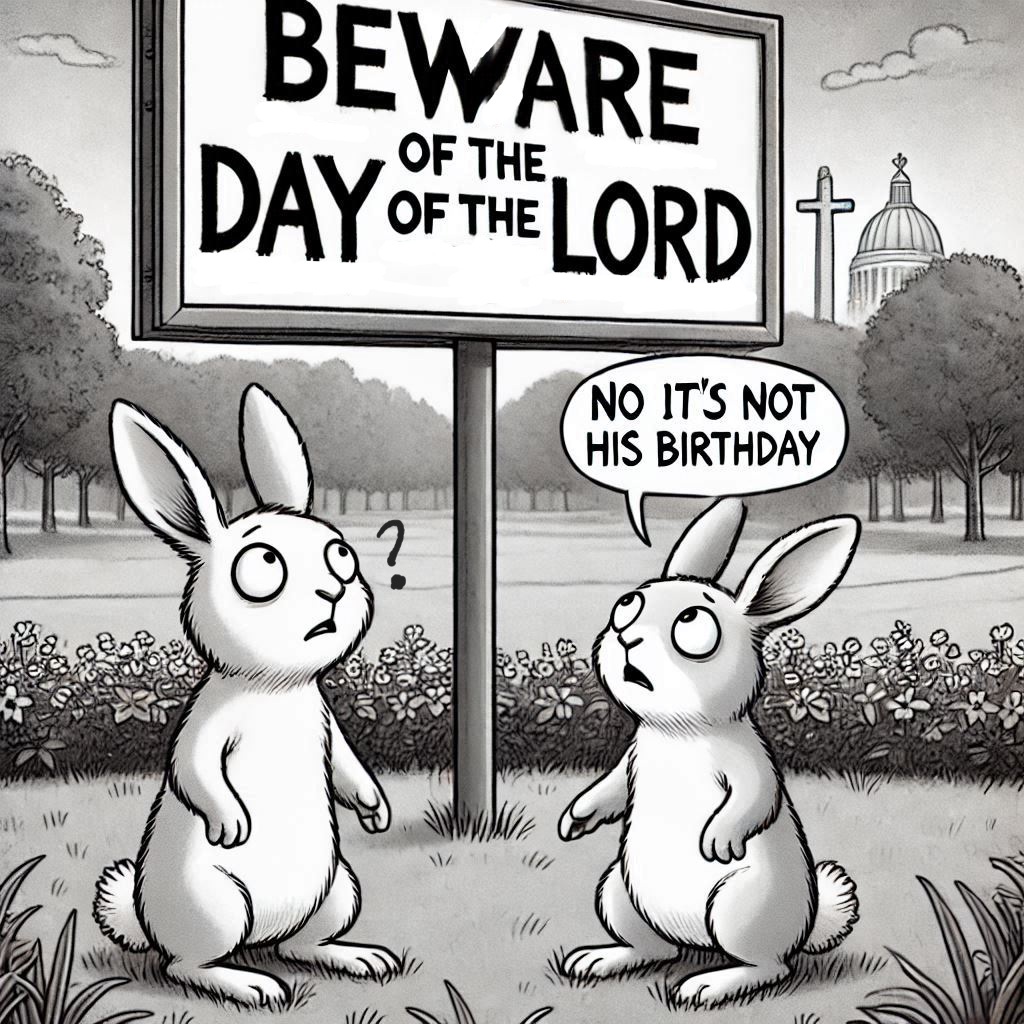What is the Day of the Lord? How is it ‘Great and Terrible’?
The prophet Joel speaks of a day that defies logic—one that’s simultaneously “great and terrible” (Joel 2:31). This paradoxical description points to one of Scripture’s most profound and sobering themes: the Day of the Lord. How can one day be both great and terrible? The answer lies in understanding God’s perfect justice and mercy, and how this momentous day affects different groups of people in radically different ways.
Throughout history, believers and skeptics alike have pondered the ultimate destiny of our world. Scripture provides a clear answer: history moves purposefully, resolutely toward that climactic moment known as the Day of the Lord. This profound biblical concept encompasses God’s sovereign intervention in human history, culminating in the final judgement and the vindication of His people.
Biblical Foundation of the Day of the Lord
The concept of the Day of the Lord (Yom Yahweh in Hebrew) appears throughout the Old Testament prophetic literature. This “day” refers not to a 24-hour period but to a time when God dramatically intervenes in human affairs to accomplish His purposes.
The prophet Joel describes it as “the great and terrible day” (Joel 2:31)—great for God’s faithful people who’re eagerly awaiting redemption, but terrible for those who stand opposed to His righteous rule.
This dual nature of the Day reflects God’s perfect justice. For those who’ve rejected God’s grace and persisted in rebellion, it brings fearsome judgment. The prophet Amos therefore warns, “Woe to you who desire the day of the Lord! Why would you have the day of the Lord? It is darkness, and not light” (Amos 5:18). Yet for God’s people, this same Day brings deliverance, vindication, and the fulfillment of all God’s promises.
Historical Manifestations
Throughout Scripture, we see smaller-scale “days of the Lord” that prefigure the final Day. These historical judgements demonstrate God’s pattern of intervention and serve as warnings and examples for future generations:
The Great Flood represents God’s judgement on universal human wickedness, while simultaneously delivering Noah’s family through the ark. Similarly, the Exodus brought judgement on Egypt while delivering Israel. The Babylonian conquest of Jerusalem in 586 BC served as another “day of the Lord,” bringing judgement on Judah’s unfaithfulness while preserving a faithful remnant.
These episodes share common elements with the final Day: divine intervention, judgement of the wicked, deliverance of the faithful, and the vindication of God’s holy name.
Essential Characteristics
The Day of the Lord displays several key characteristics that appear consistently throughout Scripture:
- It manifests God’s absolute sovereignty. This Day comes at His appointed time, not through human initiative or prediction. It demonstrates His supreme authority over all creation and history.
- It brings both judgement and salvation. Like a coin with two sides, the Day of the Lord means destruction for God’s enemies but deliverance for His people. This dual purpose reflects God’s perfect justice and mercy.
- It has universal scope. While historical “days of the Lord” affected specific nations or regions, the final Day impacts all of creation. No one stands outside its reach.
- It carries absolute certainty. God’s purposes cannot be thwarted; His Word never fails. The Day of the Lord will surely come, fulfilling every divine promise and prophecy.
The Day of the Lord in New Testament Teaching
The New Testament deepens our understanding by connecting the Day of the Lord directly to Christ’s return.
Jesus speaks of His second coming using Day of the Lord imagery from the prophets. The apostles likewise teach the Day will culminate in Christ’s return to judge the living and the dead.
Paul writes to the Thessalonians the Day will come “like a thief in the night” (1 Thessalonians 5:2), emphasising its suddenness and unpredictability. Peter adds that on this Day “the heavens will pass away with a roar, and the heavenly bodies will be burned up and dissolved” (2 Peter 3:10), highlighting its cosmic scope.
The New Testament reveals Christ Himself will stand at the centre of this Day as both Judge and Saviour. His first coming inaugurated the last days; His second coming will bring them to completion.
Signs and Portents
While Scripture provides various signs indicating the approach of this Day, it deliberately prevents precise prediction. Jesus teaches that even He, during His earthly ministry, did not know the exact timing (Mark 13:32). This mystery serves God’s purpose by keeping every generation watchful and ready.
The signs include both cosmic disturbances and moral decay, false teaching and gospel proclamation, tribulation and apostasy. Yet these signs should drive us not to speculation but to faithful service and hopeful expectation.
Implications for Believers
The doctrine of the Day of the Lord carries profound implications. It assures us good and evil will not forever coexist—God will ultimately establish perfect justice. This truth brings comfort to persecuted believers and motivation for evangelism, as Paul demonstrates in his letters.
For the church throughout history, this doctrine has provided strength to endure suffering, knowing that our present trials cannot compare to future glory. It reminds us history moves NOT CYCLICALLY BUT LINEARLY toward God’s appointed goal.
Conclusion
The Day of the Lord is one of Scripture’s most sobering and encouraging teachings. It reminds us God actively governs history, moving it toward His appointed end. For believers, the doctrine brings hope—not in our own righteousness, but in Christ who bore God’s judgement in our place.
As we await this Day, we rest in God’s sovereignty while pursuing holiness and proclaiming the gospel. For through Christ, what could have been only terrible news has become gloriously good news for all who trust in Him.
The Day of the Lord—Related FAQs
Is the Day of the Lord the same as the Millennium? The Day of the Lord and the Millennium are distinct biblical concepts that shouldn’t be confused. The Day of the Lord refers to God’s decisive intervention in history for judgement and salvation, while the Millennium refers to a specific period discussed in Revelation 20. While godly people have different views on the precise relationship between the events, we should be careful not to equate them.
- Will the Day of the Lord occur during the Great Tribulation? The Day of the Lord and the Great Tribulation are related but not identical events. Scripture presents the Day of the Lord as the culmination of God’s judgment, which may include or follow the tribulation period. Rather than focusing on precise chronology, we should emphasize being prepared through faith and holy living.
- Does the Day of the Lord only bring judgement? No, the Day of the Lord has a dual purpose of both judgment and salvation. While it brings judgment to those who have rejected God, it simultaneously brings vindication, deliverance, and joy to God’s people who have trusted in Christ.
Can we predict when the Day of the Lord will occur? Scripture explicitly warns against attempting to predict the exact timing of the Day of the Lord. Jesus Himself said that no one knows the day or hour except the Father (Matthew 24:36). Any attempts to set dates or identify precise timelines go beyond Scripture’s teaching and should be avoided.
- How should Christians live in light of the Day of the Lord? Christians should live with watchfulness and holy conduct, knowing this Day could come at any time. This includes pursuing holiness, maintaining an eternal perspective in decisions, and living with urgency in evangelism and discipleship. The reality of this coming Day should shape our priorities and motivate godly living.
- What spiritual preparations should believers make? The primary preparation is ensuring our trust is fully in Christ and His finished work, not in our own righteousness. We should also be growing in holiness, maintaining active fellowship with other believers, faithfully using our gifts to serve God’s kingdom purposes.
What comfort does this doctrine offer to suffering believers? The Day of the Lord assures suffering believers that God will ultimately right all wrongs and vindicate His people. It reminds us that present trials are temporary and that God’s justice will prevail. This provides hope and strength to endure current difficulties while awaiting our final redemption.
The Day of the Lord—Our Related Posts
Editor's Pick

No Decay, No Defeat: What It Means That Christ’s Body Saw No Corruption
On the Day of Pentecost, Peter stood before thousands and made a startling claim: David's body decayed in the tomb, [...]

GPS Without Eyes: How Ants Silently Shout Intelligent Design
Picture a leafcutter ant navigating the rainforest floor in pitch darkness, carrying a leaf fragment 50 times its body weight. [...]

Does God Truly Care About My Everyday Choices?
We believe God created the universe. We believe He orchestrated the exodus from Egypt and raised Jesus from the dead. [...]
SUPPORT US:
Feel the Holy Spirit's gentle nudge to partner with us?
Donate Online:
Account Name: TRUTHS TO DIE FOR FOUNDATION
Account Number: 10243565459
Bank IFSC: IDFB0043391
Bank Name: IDFC FIRST BANK






